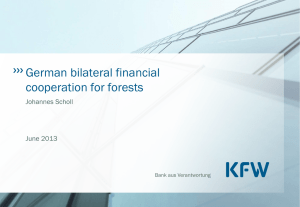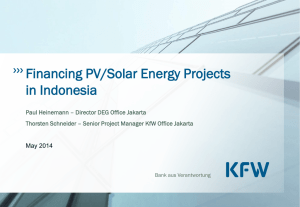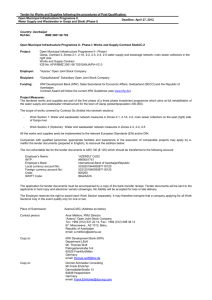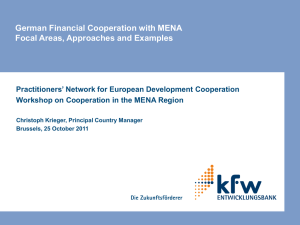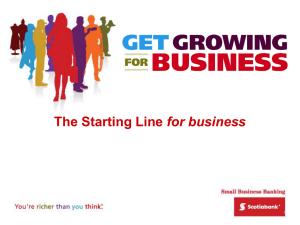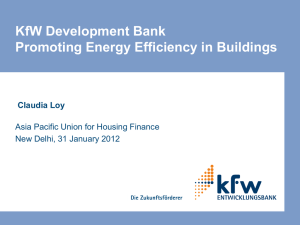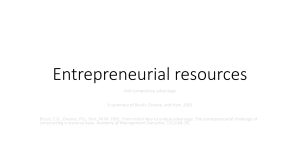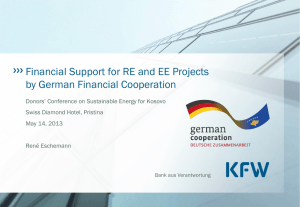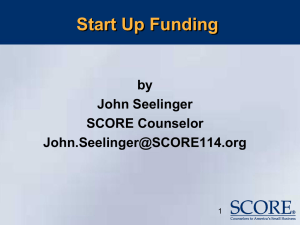Barbara Schnell
advertisement
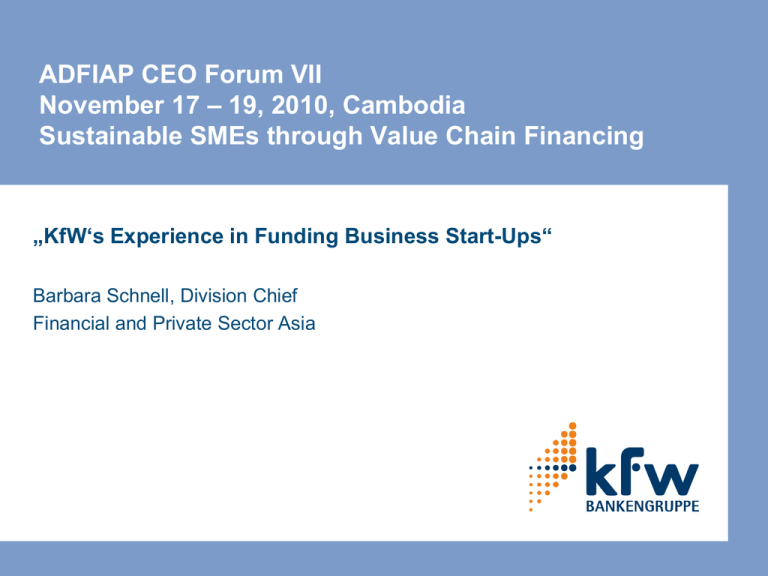
ADFIAP CEO Forum VII November 17 – 19, 2010, Cambodia Sustainable SMEs through Value Chain Financing „KfW‘s Experience in Funding Business Start-Ups“ Barbara Schnell, Division Chief Financial and Private Sector Asia Agenda 1 KfW Bankengruppe: Overview 2 Start-up Activity in Germany: Current Developments 3 KfW‘s Promotional Approach in Financing Start-ups 4 Examples: StartGeld and ERP Start Fund 5 Conclusions 2 60 years of KfW Financing with a public mission ● Promotional bank of the Federal Republic of Germany ● Founded in 1948 as Kreditanstalt für Wiederaufbau ● Shareholders: 80% Federal Republic, 20% federal states ● Headquarters: Frankfurt am Main Branches: Berlin and Bonn ● Representative offices: around 60 offices and representations worldwide ● Balance sheet total at end-2009: EUR 400 billion ● Around 4,200 employees (2009) ● Best rating: AAA/Aaa/AAA ● Zero-weight under Basel II 3 A bank with a wide array of functions Domestic promotion International business We ensure internationalisation We promote Germany Business Area Mittelstandsbank Business Area Privatkundenbank Business Area Kommunalbank Promotion of SMEs, business founders, start-ups Promotion of construction of new housing and modernisation as well as education Financing municipal infrastructure projects and global loans in Germany/Europe agency business for Federal Government We promote development Business Area Export and Project Finance Business Area Promotion of Developing and Transition Countries International project and export finance Promotion of developing and transition countries Promotion of environmental and climate protection 2 4 Start-up activity in Germany Current developments Political importance of start-ups Start-ups important for job creation/poverty alleviation – Social Aspect In addition: visible number of start-ups necessary to foster economic ability to innovate/modernize – Economic/Competitiveness Aspect Start-up activity in 2009 ● Situation largely affected by financial and economic crisis ● Downward trend prevailing since 2004 reversed; no. of new start-ups +10% YOY (EUR 0.8 mn) - 45% of these were full-time businesses (+20% YOY) ● Percentage of former unemployed persons: 30% of full-time businesses ● High portion of micro-enterprises: Total financing needs up to EUR 10.000 (68%) or up to EUR 25.000 (79%) KfW’s start-up finance in 2009 ● Promotion of 25.000 founders / Volume: approx. 3,6 bn EUR 5 Macroeconomic Push/Pull Factors for Starting Businesses Macro-Economic Push/Pull Factors in the Economic Crisis Recession: - More market entry barriers Labour Market: - Uncertainty for Employees - Fewer options for small start-ups - Higher unemployment - Fewer open positions Economic Pull Mechanisms Labour Market Push Mechanisms 2009 Total Net Effect: Increase - - Full-Time Net Effect: Increase Part-Time Net Effect: Unchanged + + 6 KfW‘s Promotional Approach in Financing Start-ups (1) Germany’s banking sector is the most crucial pillar in funding business start-ups with the MFI’s role almost insignificant Problem KfW’s Solution Lack of Collateral / Lack of Track Record Risk-Sharing with Market Partners / Guarantees High Transaction Costs Handling Fees for Banks Selection Process during Start-Up Period (exit rate of new businesses within 3 years approx. 25%) Accompanying Advisory Services / Hands-on Approach Low Percentage of Start-Ups Introducing Market Novelties Special Incentives / Access to Finance for Innovative Companies 7 KfW‘s Promotional Approach in Financing Start-ups (2) Conceptual Aspects of KfW’s Start-up Programmes Financing Programmes: - Commercial approach regarding risk assessment; bankable clients/projects - Cooperation with market partners using their distribution channels/ market expertise Supplementary consultancy services (e.g. start-up coaching) Coordination with governmental politics/measures (e.g. assistance for formerly unemployed business founders) 8 Example 1: KfW-StartGeld Maximum loan amount EUR 50,000 Working capital up to EUR 20,000 Term: up to 10 years Fixed interest rate Relaxation of collateral requirements Promotion up to 3 years after initial founding Redemption in equal monthly instalments Second application possible Prepayment in full or in part is possible at no charge Exemption of liability for on-lending bank: 80 % 9 Neutrality through on-lending principle in loan business No separate branch network Customer Customer's bank File loan application with their regular bank before start of investment If approved, customer‘s bank forwards application to KfW Enter into the loan agreement and disburse the loan refinances the loan at favourable refinancing interest rates Private individuals Enterprises Public institutions 10 Example 2: Co-Investment Scheme – ERP Start Fund KfW / ERP Special Fund Goal: Leverage of private investment capital Start-up Lead Investor - Risk Capital Principle: Provision of matching funds to a Lead Investor / pari passu approach - Management Support - Cooperation Agreement/Compensation 11 Conclusions Global Trends / Central development topics ● Sustainable economic growth ● Poverty reduction / Job creation ● Structural changes and innovation Crucial factors in financing founders / start-ups ● Finance and consultancy services ● Coordinated measures and programmes (government/welfare policy, chambers of commerce and industry, banks/financial intermediaries etc.) ● Existence of credit bureaus General features ● Standardized and transparent financing instruments ● Measures with a broad impact / outreach are important ● Package of instruments accompanying enterprises through their lifecycle 12 Contact Barbara Schnell Division Chief Private and Financial Sector Asia KfW Bankengruppe Palmengartenstrasse 5–9 60325 Frankfurt am Main Fon +49 69 7431 – 2205 Fax +49 69 7431 – 2944 barbara.schnell@kfw.de 13
